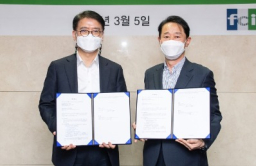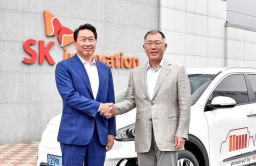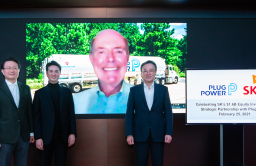-
KOSPI 2577.27 -2.21 -0.09%
-
KOSDAQ 722.52 -7.07 -0.97%
-
KOSPI200 341.49 +0.02 +0.01%
-
USD/KRW 1396 -2.00 0.14%
Eight of top 10 Korean conglomerates betting on hydrogen
Hydrogen economy
Eight of top 10 Korean conglomerates betting on hydrogen
By
May 12, 2021 (Gmt+09:00)
5
Min read
News+
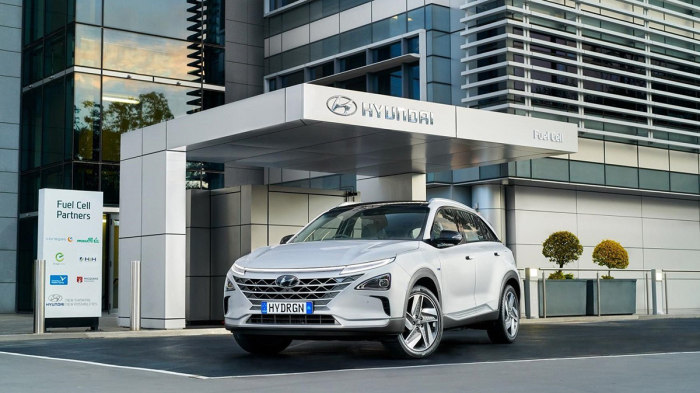
There was a time when virtually all major South Korean firms were racing to make something big and heavy. Power plants, offshore oil and gas constructions, container ships, steel plates and cars were the main growth drivers for Korea's top industry players.
Then came the semiconductors and smartphones, areas in which companies like Samsung Electronics Co. and SK Hynix Inc. are still vying for global leadership.
Now, in 2021, the largest Korean business groups, from Hyundai Motor Group, SK Group to Hyosung Group as well as longest-surviving Doosan Group, are starting to make something significantly lighter, lighter than air, sure that the substance will ensure their long-term business sustainability.
Hydrogen, the lightest element on the periodic table, is seen as the game-changer of the global economy by domestic companies, global financial institutions and management consulting firms alike.
In May 2020, Barclays wrote in a report that the global hydrogen economy is projected to reach $1 trillion by 2050. Shortly afterward, Nikkei BP CleanTech Institute raised the projection figure to around $1.5 trillion by the same year.
Leading consulting firm McKinsey further increased the number to $2.5 trillion, while Goldman Sachs basically ended the discussion last September by estimating the market size would reach $12 trillion by 2050.
HYDROGEN PLAYERS IN KOREA
According to the Korean business circle on May 11, all of the country’s 10 largest corporate giants, except Samsung Group and LG Group, have either entered or have announced plans to enter the hydrogen business. Hyundai Motor Group was among the first to invest a large sum in the segment, whereas SK Group is seen as the most aggressive player of late.
Even until the early months of 2020, many of those in the industry expressed concerns around Hyundai Motor’s hydrogen-powered Nexo vehicle, saying the automaker had “entered the hydrogen market too early.”
Hyundai Motor had invested a tremendous amount of money in developing Nexo, which initially achieved minimal sales amid the lack of related infrastructure such as hydrogen charging stations. The critics said that the country’s leading automaker should have put more focus on developing electric vehicles (EVs), highlighting that Tesla was breaking new sales records.
The market view on Hyundai Motor’s hydrogen efforts started to shift this year as hydrogen is now undeniably seen as the best energy source to achieve the global goal of carbon neutrality by 2050.
The automaker is further expanding its foothold in the sector by introducing a hydrogen fuel cell brand last year under the name of HTWO, which stands for H2, the hydrogen molecule, representing hydrogen and humanity, according to the group.
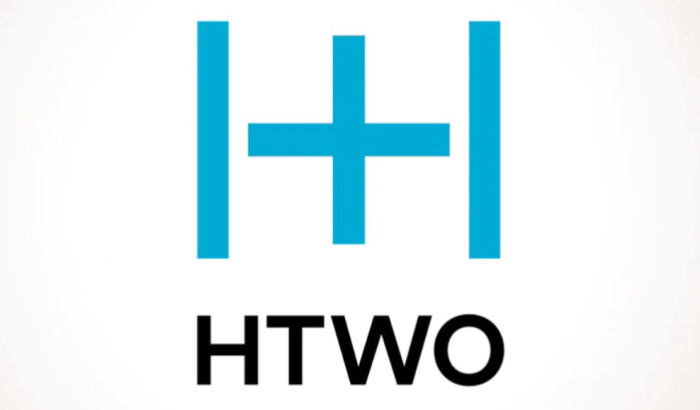
The motor group is also building a factory in Guangzhou, China, to annually manufacture 6,500 hydrogen fuel cells starting from the second half of 2022. It will also start mass production of hydrogen fuel cell-powered electric trucks from 2023 and also expand hydrogen bus models.
Likewise, SK Group is investing a total of 18 trillion won ($16 billion) in hydrogen over the next five years, focusing on hydrogen production. It will build a liquid hydrogen production plant by 2023, with an annual capacity of 30,000 tons. Another project, planned to be completed by 2025, will annually produce 250,000 tons of hydrogen in South Chungcheong Province of South Korea.
SK has also made big investments in rising global companies in the segment, such as its acquisition of around a 10% stake in the American hydrogen fuel cell technology company Plug Power Inc. SK will also set up a joint venture in Asia with the US hydrogen company to strengthen its business in the continent.
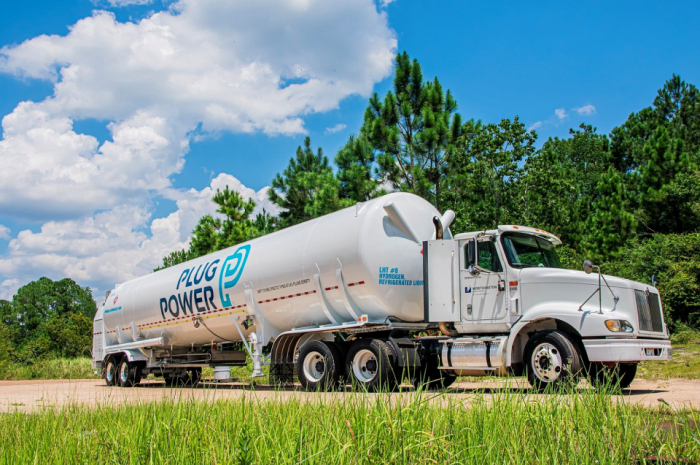
The steelmaker POSCO also shared plans to produce hydrogen to self supply energy required for steel production. Estimating that 3.7 million tons of hydrogen are needed by 2050 for making its steels, the company announced to set up relevant hydrogen production facilities to annually produce 5 million tons by the same year.
Hanwha Group, one of the global leaders in the solar cell and module segments, is creating hydrogen via an eco-friendlier method of water electrolysis. Using solar power to produce hydrogen, the company is able to make what is called green hydrogen, which does not emit greenhouse gases at all.
Other major conglomerates are also acting fast in different areas within the hydrogen sector, building on their existing capabilities and know-how. The shipbuilder Hyundai Heavy Industries Group is developing a hydrogen carrier as well as hydrogen-fueled vessels.
Doosan Group is also quickly making the transition to the hydrogen fuel cell, liquid hydrogen production and hydrogen-powered drone businesses. Hyosung Group has become a big name in the hydrogen scene too, with its hydrogen charging stations, hydrogen tanks and liquid hydrogen facilities.
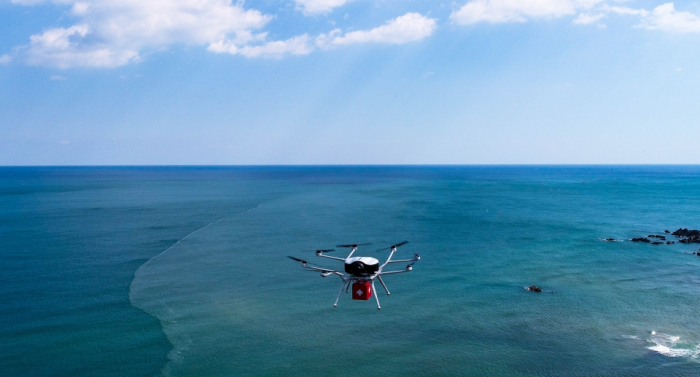
Industry analysts say that hydrogen has become the center of attention among the leading corporations in the country as it is aligned with the ongoing paradigm shift towards ESG management. They added that the hydrogen business is especially attractive for those in more traditional manufacturing sectors that have been producing large amounts of carbon emissions.
The South Korean government has also promised to support the industry’s vast efforts on hydrogen. According to the government’s plan, the country by 2040 will produce 6.2 million hydrogen vehicles, build 1,200 hydrogen charging stations and supply 15 gigawatts of power from hydrogen fuel cells.
Write to Jae-Kwang Ahn at ahnjk@hankyung.com
Daniel Cho edited this article.
More To Read
-
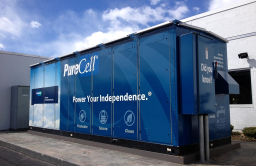 Hydrogen businessDoosan sets sights on hydrogen business as future growth engine
Hydrogen businessDoosan sets sights on hydrogen business as future growth engineApr 20, 2021 (Gmt+09:00)
-
Mar 08, 2021 (Gmt+09:00)
-
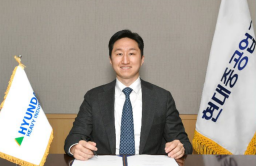 Hydrogen tie-upHyundai Heavy, Aramco form global hydrogen partnership
Hydrogen tie-upHyundai Heavy, Aramco form global hydrogen partnershipMar 03, 2021 (Gmt+09:00)
-
Mar 02, 2021 (Gmt+09:00)
-
Feb 25, 2021 (Gmt+09:00)
-
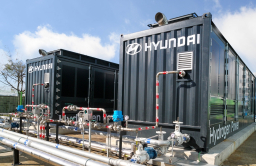 Hydrogen tie-upHyundai Motor, POSCO steelmaking tie-up to develop hydrogen tech
Hydrogen tie-upHyundai Motor, POSCO steelmaking tie-up to develop hydrogen techFeb 23, 2021 (Gmt+09:00)
-
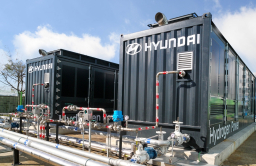 Hydrogen tie-upHyundai Motor, POSCO tie up in hydrogen projects
Hydrogen tie-upHyundai Motor, POSCO tie up in hydrogen projectsFeb 16, 2021 (Gmt+09:00)


